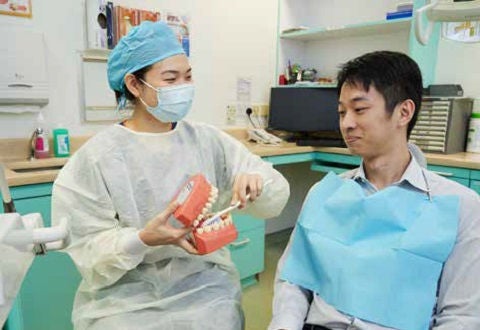
Oral Health Therapist Ms Yap Xin Ying shares about her job scope and how it has recently been expanded to cater to the growing needs of an ageing population.
“Oral Health Therapists (OHTs) are not dentists-in-training. In fact, OHTs are qualified dental professionals who provide comprehensive care to patients,” shared Ms Yap Xin Ying, Principal Oral Health Therapist, National Dental Centre Singapore (NDCS). She aims to bust this common misconception.
OHTs work alongside dentists. It is a job that Ms Yap, who joined the profession in 2009 after graduating from Nanyang Polytechnic, is immensely proud of. “I enjoy making a positive impact on patients’ lives by helping them achieve healthier smiles and improved overall well-being,” she said.
Unlike dentists, who primarily diagnose and treat dental issues, OHTs champion preventive dental care. They educate patients on oral hygiene, and proper ways to care for their teeth and dental appliances such as braces and dentures.
Their job scope sometimes overlaps that of dentists. This includes seeing patients for dental prophylaxis, which involves teeth scaling and polishing to remove plaque and tartar. OHTs are also well-qualified to perform tasks such as extractions and restorations of primary teeth for those aged 18 and below.
OHTs also take dental radiographs that dentists use for diagnosis and treatment planning. They can refer patients to specialists when necessary, ensuring that patients receive appropriate and comprehensive care.
In recent years, OHTs have been increasingly involved in managing the growing dental care needs of older patients in a fast-ageing population. Since 2022, SingHealth’s OHTs have expanded their role to provide independent oral assessments and basic dental treatment in Intermediate and Long-term Care facilities (ILTC).
“Our enlarged job scope means patients can have their oral health taken care of, and see the dentists only when they require more complex dental or surgical procedures.” The move is also a positive one, according to Ms Yap, as it allows OHTs like herself “to better meet the evolving needs of patients and contribute to the population needs in Singapore”.
Now, OHTs can assess and triage patients, and efficiently allocate resources and direct individuals to the appropriate care pathways. They can also perform post-surgical wound management and suture removal, which helps in streamlining the recovery process and promote optimal healing outcomes. Patients can expect services and procedures, including intra-oral 3D scanning, and orthodontic debanding procedure for patients who have completed orthodontic treatments.
To satisfy the requirements of the expanded job scope, NDCS has developed a training programme to prepare SingHealth’s OHTs to perform procedures competently. The programme includes lectures, practical face-to-face workshops, and competency assessments.
Being an OHT, however, comes with its own unique set of challenges. “Motivating patients to adopt and maintain good oral hygiene habits, and managing time efficiently to provide thorough care to each patient is something I have to do daily.”
Read here: Up to 90% of Singaporeans have gum disease. What puts you at risk and how to avoid it? Click here for answers.
Dental visits can be stressful for some patients, and Ms Yap helps to manage their mental and emotional roadblocks. “The most challenging cases I have seen often involve complex periodontal issues or patients with significant dental anxiety. They will require specialised techniques to effectively manage their care with patience and empathy,” she said.
Naturally, what gives Ms Yap most fulfilment in her job is seeing her patients return with positive feedback — and a more brilliant smile — after following her advice. “I feel happy when my patients update me that their gums are no longer bleeding or if they notice that their breath has freshened up.”
An important, albeit surprising, dental tip that Ms Yap wants everyone to know is that brushing your teeth twice a day is simply not enough. “Most patients do not realise that tooth brushing alone is not sufficient. We need to floss or use interdental brushes to clean between our teeth daily to reduce bacteria build-up. This helps prevent tooth decays and gum diseases.”
Get the latest updates about Singapore Health in your mailbox! Click here to subscribe.













 Get it on Google Play
Get it on Google Play